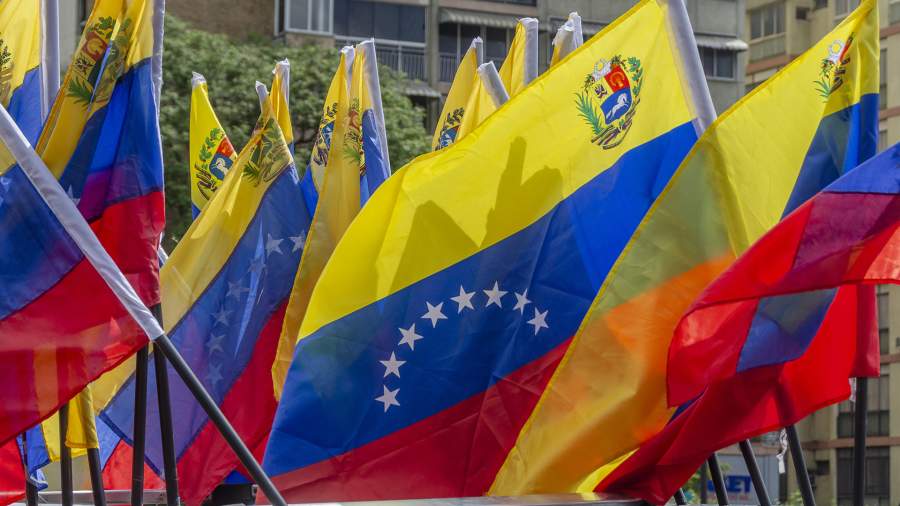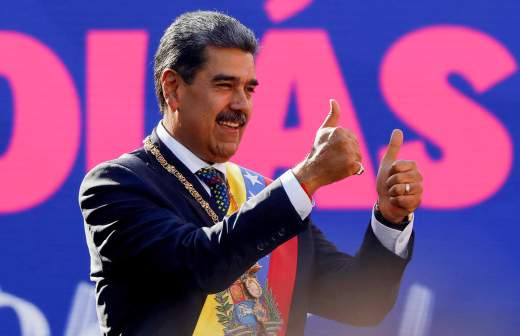Disabling the veto: Venezuela is working on joining BRICS

Venezuela is working on joining the BRICS, the Russian Embassy in the Latin American country told Izvestia. Caracas is aware of the growing role of the association on the world stage and attaches great importance to its cooperation. Diplomats also note a high interest in strengthening ties with Moscow. Venezuela is already conducting an active dialogue with most of the countries of the association. Nevertheless, full-fledged participation is hindered by the conflict with the Brazilian authorities, and it is this country that is chairing the association in 2025. What Venezuela is ready to give BRICS and whether the republic will be able to overcome the Brazilian veto is in the Izvestia article.
Venezuela continues to be interested in BRICS
Venezuela continues to work towards joining the BRICS. The Russian Embassy in Caracas told Izvestia about this.
— Venezuela is aware of the growing role of BRICS on the world stage and, of course, attaches great importance to cooperation in this format. To become a part of an association, it is necessary to enlist the support of all its members. We see that Caracas does not stop working in this direction," the Russian diplomatic mission noted.
During the year of the Russian BRICS presidency, the Venezuelan authorities actively expressed their hope to join the association at the Kazan summit in October 2024. Earlier, at the end of August, the Foreign Minister of the Bolivarian Republic, Ivan Gil Pinto, even stated that Caracas was already actually part of the BRICS and joining the organization was just a formality.
"Thus, we are in the BRICS orbit. And the formalities, the method of entry [...] will depend on what the organization determines," said the head of Venezuelan diplomacy.
To resolve the formalities, Venezuelan President Nicolas Maduro personally flew to Kazan for the summit, which was a big surprise. He met with Vladimir Putin and took part in meetings of the association. Nevertheless, there was no news about the inclusion of Caracas in the BRICS in any status. The reason for this, as it turned out later, was Brazil's veto.
"As for the admission of Venezuela or any other country to the BRICS, this is possible only by consensus. We have a rule: in order to accept any candidate for this organization, the BRICS association, you need the consent of all participants in this association. It is impossible to take such a step without this," Vladimir Putin said at a press conference following the summit in Kazan.
Disagreements between Caracas and Brasilia began after the presidential elections in Venezuela in July 2024. According to the results of counting 80% of the ballots, Nicolas Maduro won for the third time. Brazil and a number of other Latin American countries insisted on making public the results of counting 100% of the ballots, as well as voting protocols for each of the polling stations. This never happened, and on January 10, Maduro took up another six-year term, despite criticism from the EU, the United States and parts of neighboring countries.
At the same time, Russia recognizes the results of the vote and considers Maduro the legitimate leader of Venezuela.
"It's normal for disagreements to arise. How are they solved? By providing protocols. [...] When the results are presented and their validity is confirmed, we will be obliged to recognize the results of the elections in Venezuela," Brazilian President Luiz Inacio Lula da Silva explained his position at the end of July 2024.
Regarding the veto on Venezuela's inclusion in the BRICS, Brazil stated that this was not a matter of disagreement with the political regime in the Bolivarian Republic, but a matter of loss of trust.
"We acted with the best intentions, but with Venezuela, trust was lost," said Celso Amorim, an adviser to the Brazilian president.
Venezuela expressed outrage at the actions of Brazilian diplomats, who, according to Caracas, use the blockade policy against the country.
Venezuela's relations with the BRICS countries
The BRICS member countries have different views on Venezuela's potential entry. The position of the Russian Federation in this case differs from that of Brazil. At a press conference, Vladimir Putin said that he had discussed the situation with Lula da Silva and emphasized that Venezuela was fighting for its independence and sovereignty.
Moreover, the positions of Russia and Venezuela coincide on most issues, and cooperation is developing at a very high level.
— The Russian-Venezuelan strategic partnership is dynamically developing in a wide range of areas. New initiatives to strengthen bilateral cooperation are regularly emerging.: from nuclear medicine to agriculture, from military-technical cooperation to culture. Projects are being implemented in the field of geological exploration of minerals, biosafety, and the agricultural sector. There are promising developments in most areas," the Russian Embassy in Venezuela says.
Venezuela is actively building a political dialogue with India and Iran. Immediately after the BRICS summit, Venezuelan Vice President Delcy Rodriguez went on a visit to New Delhi. At the meeting, the parties discussed cooperation in the field of energy.
Venezuela has recently been actively cooperating with Iran in the military sphere. According to the Argentine news portal Infobae, Iran has deployed a drone development base at the El Libertador air force base in the Latin American republic. It is also reported that the Iranian Mahan Air planes transported gold from Caracas to Tehran, in exchange for which the Islamic Republic supplied Venezuela with oil.
Venezuela is also closely cooperating with the BRICS countries on the economic track. For example, by the end of 2023, China was the largest importer for the Bolivarian Republic — 40% of supplies came from there. Brazil was in second place (13%), followed by Mexico, Turkey, Spain and Colombia. In terms of exports, Venezuela has focused most on the United States, despite American sanctions. 60% of all products were shipped to the United States — Washington mainly buys oil from Caracas. After the United States, China, Spain, Brazil, Turkey and France are among the main export destinations.
— Venezuela has good relations with many BRICS countries. It is not so much the level of trade that is important here, but the fact that almost all the BRICS countries recognize the current Maduro government. For example, the UAE was one of the first to congratulate Maduro on his victory. South Africa and Iran also recognize Maduro's victory. Nevertheless, in order for Venezuela to join the BRICS, Brazil's trust must be restored. You can't put pressure on this country to change its mind, Caracas needs to establish relations with Brasilia on its own," says Viktor Kheifets, professor at the Faculty of International Relations at St. Petersburg State University.
Of course, joining BRICS is important for Venezuela, among other things, because it will help reduce the impact of Western sanctions on its economy. In 2024, inflation in the country was 48%, although it was the lowest in the last 12 years. Cooperation with the organization would allow Caracas, in particular, to gain access to the resources of the New BRICS Development Bank.
In turn, Venezuela can provide its resources to the members of the association. In August 2024, Nicolas Maduro did not rule out the transfer of rights to develop oil and gas fields in the country to the BRICS states. If the United States and its allies continue attempts to destabilize the situation in the country, previously signed permits for those oil and gas fields will be transferred to the countries of the association, Maduro warned.
Venezuela has the largest oil reserves in the world — more than 300 billion barrels, and is also ranked eighth in the world in terms of gas reserves. The country has impressive reserves of mineral resources (iron, aluminum, coal, gold, diamonds) and has a developed agriculture — it grows corn, soybeans, sugar cane, rice, coffee, cocoa, vegetables and fruits.
Переведено сервисом «Яндекс Переводчик»


